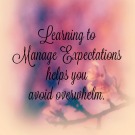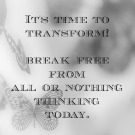Ah, the joy of coworkers. If you’re anything like me, you’ve been around long enough to have experienced, the good, the bad, the usually not so ugly, and the downright incompetent. I’ve had the great honor of working alongside some very smart and capable people and have luckily only had to deal with a select few not so smart folks.
This, combined with the number one question / consternation / issue I hear in my work led me to ask:
- Why do we expect what we do from our coworkers and
- Why do we believe a certain person is so lazy?
These led to a final question: How do we place expectations on others and if we could change that, how would we understand ourselves and others better?
Fairness and “The Promise”
We’ve all heard “life isn’t fair” and while we inherently understand this, it becomes all too clear when we feel it. Nothing brings out these feelings more than when we perceive differences in ourselves and others in the workplace. Feelings that especially frustrate us or make us feel resentful often cause us to jump to the conclusion that “something” isn’t fair.
We also may still believe in “the promise.” The promise is that belief that if we do a, b, and c, we will have worked hard and we will then deserve x, y, and z. And it’s true. There’s nothing more rewarding in life than to do the work, live up to our own expectations, and then be rewarded for it. After all, we deserve it, right? But let’s face it, that reward doesn’t always happen. And it leaves us feeling angry and betrayed.
When we are faced with a sense of unfairness, and / or we perceive that others aren’t’ pulling their weight, or aren’t doing what we think they “should” be doing, it’s important to understand what may be going on and that is:
- We have placed the expectation we have of ourselves on others
- Others do not live up to our expectations of them, and we become frustrated / angry / resentful
- We fail to recognize that the expectations we have of others are not the same expectations they have of themselves and…
- We fail to recognize that others are AOK with their expectations, just like we’re AOK with the expectations we set for ourselves.
Understanding this cycle can help you not only understand yourself better, but it can also help you have better relationships at work. Try the following four steps to break this cycle.
Get Curious When You Get Frustrated
The first step is to notice when you perceive someone as not having the same expectations of themselves as you have of them. When this happens (and you’ll know when it happens because you’ll feel it), get curious.
- What are they doing or not doing that is causing your reaction?
- What “should” they be doing?
- What are they doing instead of what they “should” be doing?
- Are you frustrated with them, or with someone else that you think should be handling the situation better such as another coworker or a supervisor?
People with high expectations of themselves hold others to that same bar, and many times others may be doing the best they can (more on this in a bit), but will never meet the high bar standard you set for them. In truth, they may be struggling to reach the bar they set for themselves. By staying curious, you can not only learn about yourself but also about how you may be projecting your expectations onto that person.
Ask Questions
Step two invites you to learn what’s really going on, and the best way to do that is to simply ask. And by asking, I don’t mean accusing or interrogating, I mean asking questions to gain understanding. Because your expectations of another are different from the expectations they have of themselves, work on getting to know their work style and what they value. See how your perspective changes if you hold the assumption of “they are doing the best they can” in mind as you’re talking to them. Notice their demeanor. Notice if their desk is a tornado of paper or neatly organized. Ask them how their weekend was and then not only listen to the response but also how they say it.
Depending on your situation you can also address this with your superior. By discussing your expectations of yourself, your manager, and your coworker in a clear and calm manner, you may uncover things you didn’t know about the other parties.
Set Boundaries
Once you have an awareness around where you may be projecting expectations you have for yourself onto others, and you’ve had conversations with both your superior and your coworker (both of whom you can hopefully talk to for the sake of better understanding), it is up to you to start setting and maintaining new boundaries.
Boundary setting can be nerve-wracking because in most cases it will require you to take a risk. It will require you to become extremely clear on what you need, have conversations with others about those needs, and then ultimately keep the boundaries that you have set through consistent words and action. Though this can be scary, it’s so powerful! You get to decide what limits to set and how to have the needed conversation. You are the one that is in control of how you respond to the situation. Think of boundary setting as a powerful tool instead of something to be feared.
Make the Call. Take the Lead.
The last step in managing expectations is to revisit how you want to spend your time, energy, and manage your personal and career growth. By understanding the expectations you have for yourself and others, by asking questions, and by setting boundaries, you can make wise decisions that will free you mentally, emotionally, and physically.
Managing your expectations of others at work asks you to be the leader of your own life instead of staying stuck and frustrated by your circumstances. By asking questions and watching when you are projecting your expectations onto others, you can learn not only about yourself but about the needs of your coworkers and your team. You also learn to set and maintain effective boundaries. Making the call and taking the lead will leave you feeling as though you made choices that are right not only for you but for others too.






